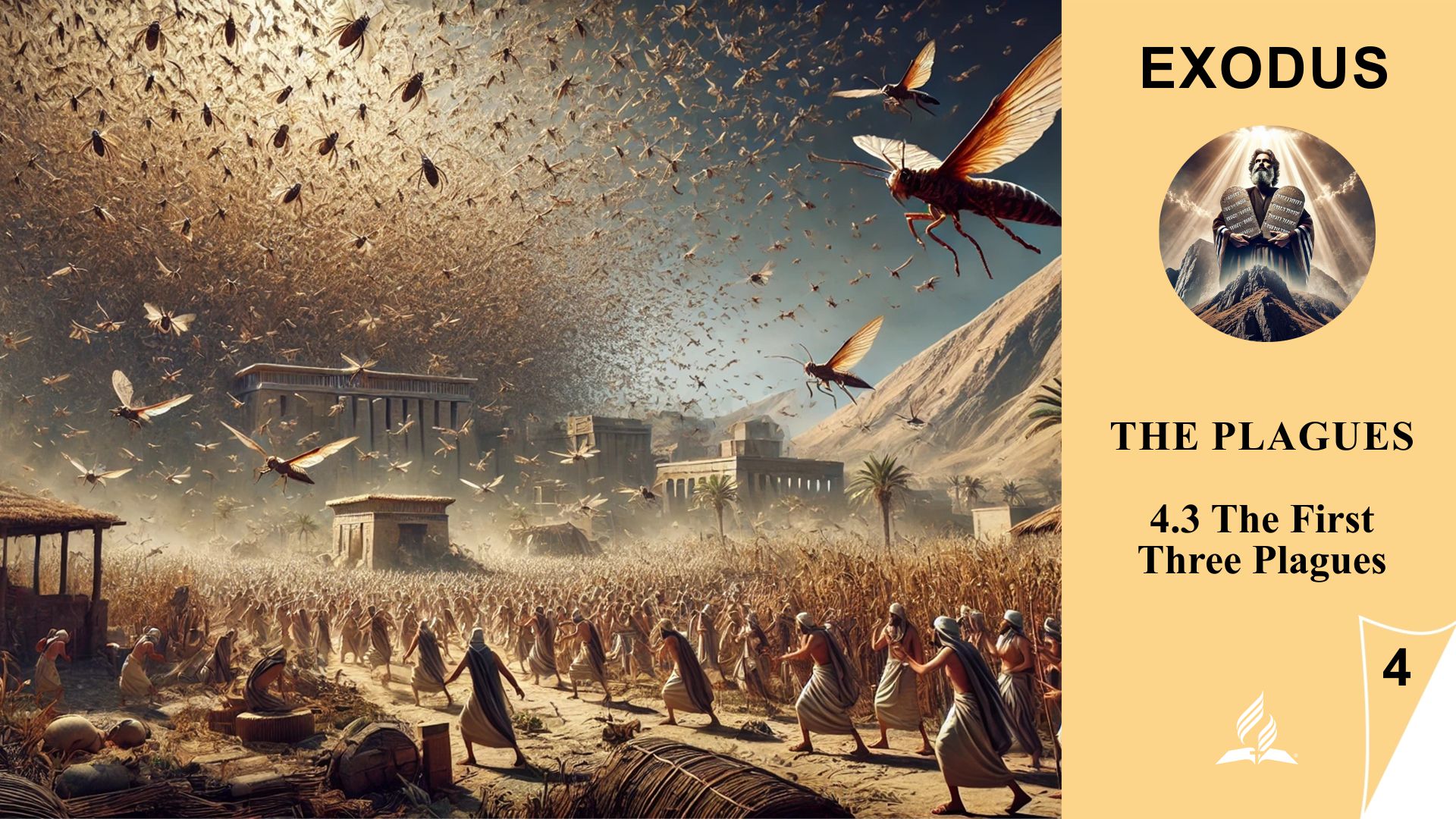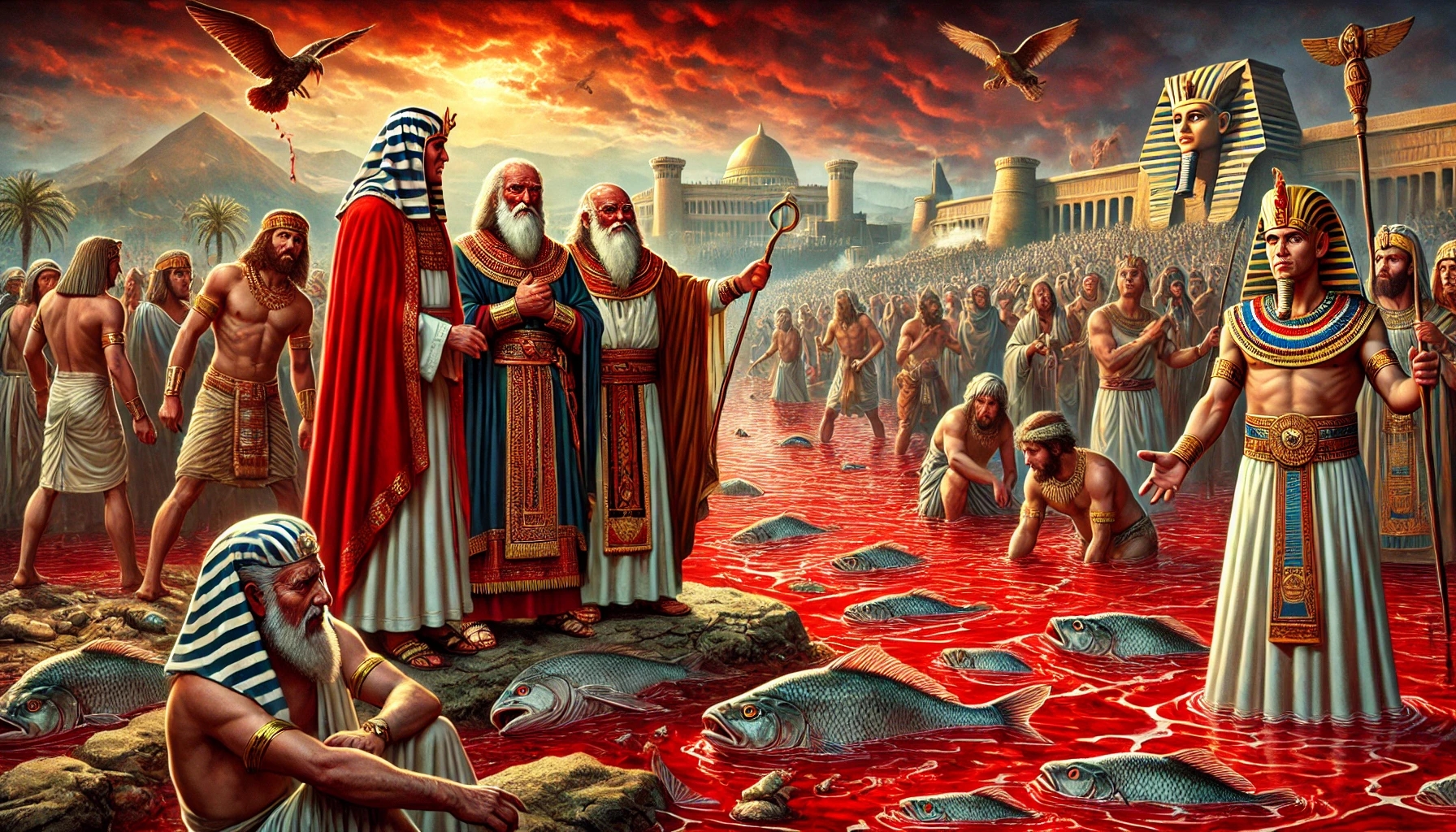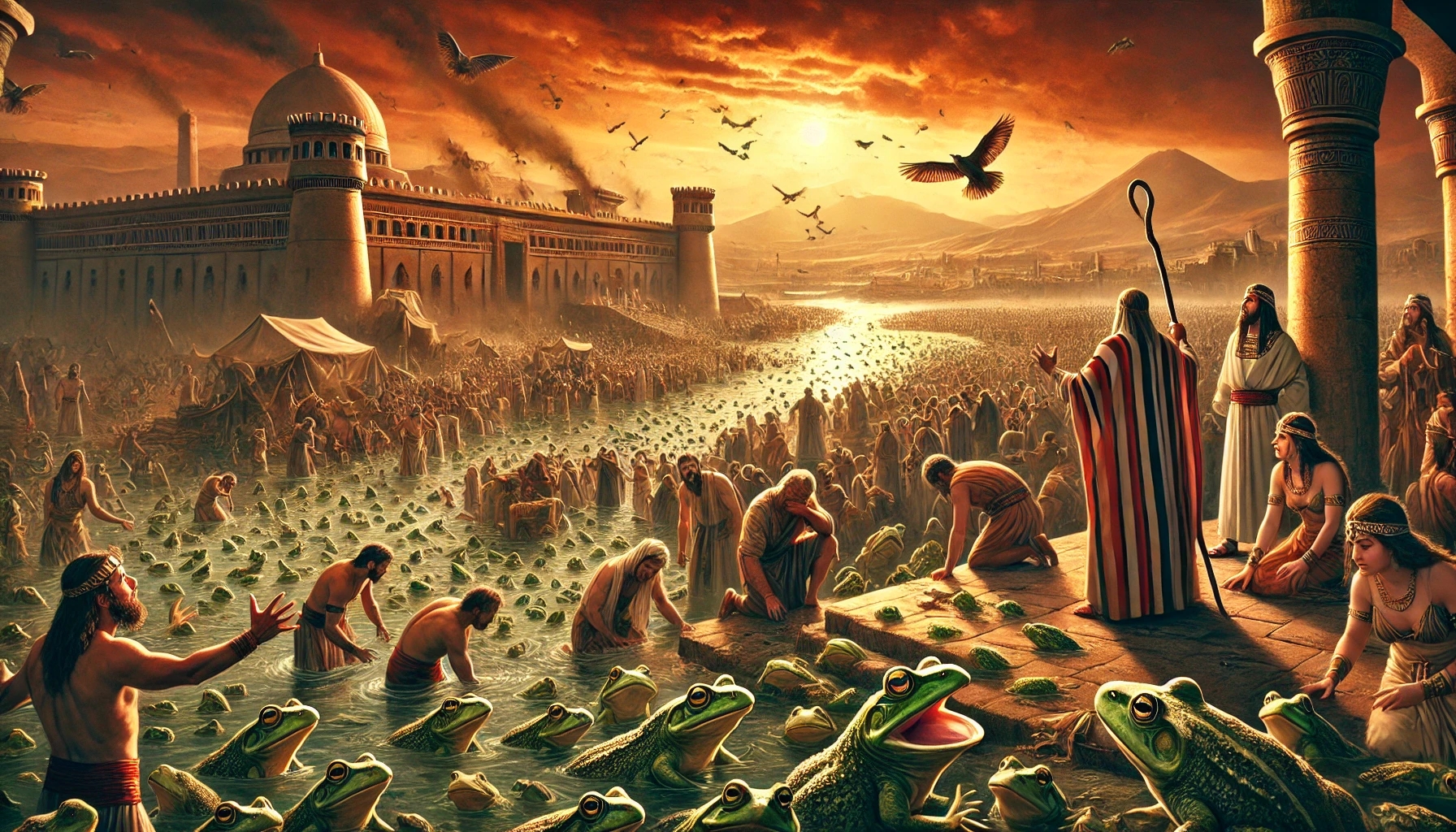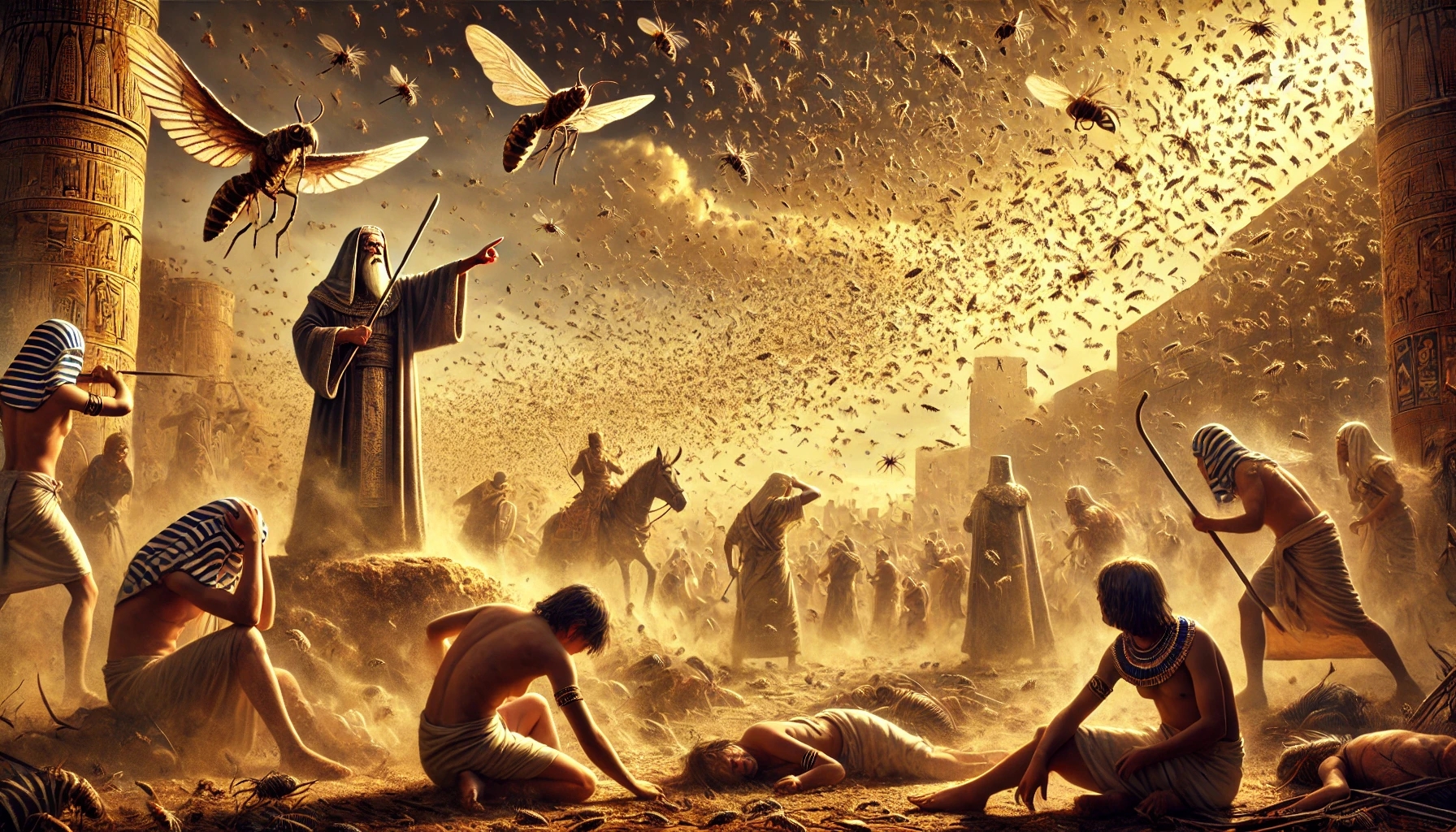Lesson 4.The Plagues | 4.3 The First Three Plagues | EXODUS | LIVING FAITH

⛪ Lesson 4: The Plagues
📘 4.3 The First Three Plagues
✨ God Exposes the Gods of Egypt – Three Plagues, Three Revelations
………………………………………………………………….
🟦 Introduction
The ten plagues in Egypt were not mere catastrophes or divine punishments – they were deliberate revelations of God.
They were not only directed at Pharaoh but also at Egypt’s religious system, which was built on many gods. Each plague confronted one of these gods, revealed their powerlessness, and at the same time unveiled the true God, the Lord of heaven and earth.
But this was not only about Egypt. The people of Israel also learned who God truly is through this confrontation. In the midst of it, God revealed Himself as a patient teacher, but also as a righteous judge.
………………………………………………………………….
📖 Bible Study – The First Three Plagues (Exodus 7:14–8:19)
Introduction to the Biblical Context
The confrontation between Moses and Pharaoh was not a regular political negotiation – it was a spiritual conflict of cosmic dimension.
At its core stood the question: Who is the true God?
God had already told Moses that Pharaoh’s heart would be hard and that he would resist God’s will (Ex. 7:14). Yet God did not give up – instead, He began to demonstrate His power through signs, so that both Egypt and Israel would know who the Lord is (Ex. 7:5).
The plagues were not random natural disasters, but targeted challenges to Egypt’s religion, culture, and worldview.
First Plague: The Nile Turns to Blood (Exodus 7:14–25)
Historical and Religious Background
The Nile was the lifeline of Egyptian civilization. All life in Egypt depended on the Nile: agriculture, drinking water, transport, and economy. Naturally, the Egyptians deified it – personified in the god Hapi, whom they thanked for the annual flooding that brought fertility.
Divine Action
God told Moses:
“Take your staff and strike the water of the Nile, and it will turn into blood” (Ex. 7:17).
The water became undrinkable, all fish died, and the river stank, defiling the land.
Symbolic Meaning
The source of life became a symbol of death – a direct attack on the religious heart of Egypt.
God was declaring:
“Only I am the Creator of life. No idol, no river, no human belief can provide or sustain it.”
Response
Egypt’s magicians could imitate the miracle – but not reverse it.
This shows: Demonic power can imitate, but not redeem.
Pharaoh remained unmoved.
Second Plague: Frogs Cover the Land (Exodus 7:26–8:11)
Symbolism of Frogs
Frogs were considered sacred animals in Egypt, especially connected to the goddess Heket, the deity of birth, fertility, and renewal – often depicted with a frog’s head.
Divine Action
By God’s command, frogs came “from the Nile” and overran every part of Egyptian life: homes, beds, kitchens, even ovens.
What was once revered became disgusting.
A Divine Satire
It’s as if God says:
“You worship frogs? Fine – have them in abundance!”
What was sacred becomes a plague.
God exposes the absurdity of idolatry: Those who trust in false gods won’t be blessed – they’ll be burdened by them.
Pharaoh’s Reaction
Pharaoh begged Moses and Aaron to pray to God to remove the frogs – recognizing only God had power.
Moses let Pharaoh choose the timing – another display of God’s control.
But once the frogs died, Pharaoh hardened his heart again.
Third Plague: Gnats from the Dust (Exodus 8:12–15)
The Setup
Without any warning, the third plague came. God commanded Moses to have Aaron strike the dust of the earth – and from it came gnats (or lice or mosquitoes – the Hebrew word kinnim is unclear).
Religious Connection
This plague targeted Geb, the god of the earth. Dust, considered life-giving in Egyptian belief, now brought suffering.
An Echo of Creation
In Genesis 2:7, God formed man from the dust and breathed life into him.
Here, the opposite happens:
Dust becomes a plague.
Life becomes torment.
God showed He alone has power over creation – not Geb, not magic, not the earth.
Magicians’ Reaction
For the first time, Egypt’s magicians gave up.
They admitted:
“This is the finger of God” (Ex. 8:15).
This confession was pivotal: they acknowledged a power beyond them – the living God.
Yet Pharaoh remained hardened.
Summary of the Three Plagues
-
First Plague – Against Hapi, god of the Nile: Life-giving water turns to blood – symbol of death.
-
Second Plague – Against Heket, goddess of fertility: Frogs, once sacred, become repulsive.
-
Third Plague – Against Geb, god of the earth: Dust brings affliction, not life.
In each case, a central pillar of Egyptian religion was challenged, exposed, and overthrown – not through force, but through the sovereignty of the Creator God.
Theological Conclusion
The first three plagues make it abundantly clear:
-
God is not one god among many – He is the only One who acts, speaks, judges, and saves.
-
Idolatry is not neutral – it leads to chaos, suffering, and spiritual blindness.
-
God’s judgment is always an invitation to repentance – each plague came with a chance to respond:
“Let My people go, so that they may serve Me.”
………………………………………………………………….
📖 Answers to the Questions
Question 1: What happened during these plagues? (Exodus 7:14–8:19)
The first three plagues clearly show how God dismantled the false gods of Egypt:
-
Plague 1 – Water to Blood:
Against Hapi, god of the Nile. The river becomes death, not life. Only God can give life. -
Plague 2 – Frogs:
Against Heket, goddess of fertility. Frogs, once honored, become disgusting. God alone governs creation and fertility. -
Plague 3 – Gnats:
Against Geb, god of the earth. Dust brings torment, not blessing. The magicians admit:“This is the finger of God.”
Question 2: What lessons can we learn from repeatedly rejecting God’s promptings?
Pharaoh’s heart grew harder with each act of resistance. It began with one conscious “No”, and developed into spiritual deafness.
The Bible shows a spiritual principle:
Those who reject light lose the ability to perceive it.
God’s patience is great – but those who ignore it walk toward self-hardening.
This lesson still applies today.
………………………………………………………………….
✨ Spiritual Principles
-
God’s judgment is revealed light – each plague was also a call to awareness.
-
Idolatry degrades people – what we worship ends up ruling over us.
-
Resistance to God has consequences – the heart doesn’t harden by chance.
-
God gives many opportunities to turn back – but He doesn’t force.
-
True power is not shown in magic or politics, but in truth and the Creator’s authority.
…………………………………………………………………
🧩 Application for Daily Life
-
Are there modern idols in my life? Success, safety, health – things I rely on more than God?
-
How do I react to God’s correction? With resistance – or with humility?
-
Am I willing to let go of false security to give God full space?
-
Do I take God’s voice seriously the first time – or wait until it hurts?
God’s goal is not to frighten us – but to save us.
The sooner we respond, the softer our hearts remain.
………………………………………………………………….
✅ Conclusion
The first three plagues make it clear:
God is not a distant observer – He acts, speaks, judges, and saves.
He enters history – not to destroy, but to reveal truth and invite repentance.
Pharaoh was not hard by accident.
He chose rejection – again and again.
That same warning applies to us:
Whoever constantly says no to God may eventually lose the ability to say yes.
Yet repentance is simple:
A humble “yes” to God can change everything.
………………………………………………………………….
💭 Thought of the Day
“It is not God’s power that hardens our hearts – but our resistance to His truth.”
………………………………………………………………….
✍️ Illustration – The River of Control
Chapter 1: The CEO
Marc Bender was a successful CEO of a global water utility company.
He didn’t believe in God – only in numbers, strategy, and influence.
To him, water was not a symbol of life, but a resource, a means of power.
In recent years, he had pressured many communities – raised prices, bought out small providers, redirected rivers.
Then, one Wednesday in October, something unusual happened:
An entire region’s water turned red.
Chapter 2: The Report
Lab tests showed: no poison, no chemicals, no technical failure.
The water looked like blood. No fish survived.
Panic spread.
Marc was furious – he blamed sabotage, conspiracy.
Everyone but himself.
A Christian employee whispered:
“Maybe it’s a sign…”
Marc laughed in his face.
Chapter 3: The Frogs
Days later, frogs appeared in the company’s high-tech facilities.
Hundreds. Thousands.
They clogged pipes, server rooms, and production lines.
Nothing could stop them.
Plants shut down. Partners pulled out.
Marc raged:
“How is this possible? Who’s behind this?!”
But at night, he began to dream:
A man at a river, saying:
“Let My people go.”
Marc woke up sweating.
Chapter 4: The Gnats
Soon after, swarms of gnats appeared on company grounds. No one knew from where.
They bit workers, jammed machines, invaded IT servers.
The technicians gave up.
The board panicked.
An analyst told Marc:
“This isn’t explainable anymore. I think… it’s like the Old Testament. The finger of God.”
Marc exploded:
“Fairy tales? I control the water – not some invisible being!”
Chapter 5: The Voice
After collapsing, Marc was taken to a clinic.
In the quiet, he heard the voice again:
“What you control – you did not create.”
“What you manage – is not yours.”
He began to read – first in secret – then openly: Exodus. The plagues. Pharaoh.
He saw himself.
Pride. Control. Refusal.
Chapter 6: The Turnaround
One night, Marc entered a tech room alone.
He placed his hand on a pipe and prayed:
“God… I surrender. You are greater than me. I want to listen. I want to obey.”
The next morning – no red water. No frogs. No gnats.
The systems worked.
He knew: Not because he solved it – but because God had waited.
Chapter 7: The New River
A year later, Marc founded a nonprofit for clean water access.
He stepped down publicly, gave leadership to a young engineer, and joined a small home Bible group.
At the opening of a village well, he said:
“I’ve learned: Whoever tries to control life will lose it. But whoever gives it to God – will be truly free.”
Moral of the Story
Like Pharaoh, God’s signs are clear – but our response decides whether they lead to repentance or judgment.
Marc wasn’t a tyrant – just a man who thought he could control the source of life.
Only when he let go did he discover what true life is.























